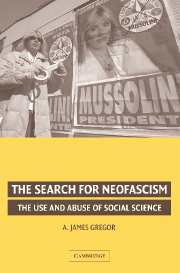Book contents
- Frontmatter
- Contents
- Preface
- Acknowledgments
- 1 The Decay of an Enterprise
- 2 Fascism
- 3 Neofascism: Some Presumptive Candidates
- 4 Julius Evola, Fascism, and Neofascism
- 5 Black Nationalism and Neofascism: Marcus Garvey and the Universal Negro Improvement Association
- 6 Black Nationalism and Neofascism: Elijah Muhammad and the Lost-Found Nation of Islam
- 7 Islamofascism: Neofascism in the Middle East
- 8 Hindutva: The Case for a Saffron Fascism
- 9 Post-Maoist China: Fascism with Chinese Characteristics
- 10 Conclusions
- Index
1 - The Decay of an Enterprise
Published online by Cambridge University Press: 05 June 2012
- Frontmatter
- Contents
- Preface
- Acknowledgments
- 1 The Decay of an Enterprise
- 2 Fascism
- 3 Neofascism: Some Presumptive Candidates
- 4 Julius Evola, Fascism, and Neofascism
- 5 Black Nationalism and Neofascism: Marcus Garvey and the Universal Negro Improvement Association
- 6 Black Nationalism and Neofascism: Elijah Muhammad and the Lost-Found Nation of Islam
- 7 Islamofascism: Neofascism in the Middle East
- 8 Hindutva: The Case for a Saffron Fascism
- 9 Post-Maoist China: Fascism with Chinese Characteristics
- 10 Conclusions
- Index
Summary
In the course of the closing decade of the twentieth century, a dedicated minority of journalists and academics decided that the rise of “neofascism” posed a serious threat to public decency and political integrity in the Western industrialized democracies. One consequence was that by the first years of the twenty-first century, literally hundreds of books and articles dedicated to some sort of treatment of the subject had appeared. Their intended purpose was to warn society of the insidiousness of the peril.
For these works to have accomplished their purpose, one would have expected some indication of what “neofascism” meant, followed by a serious treatment of the candidate neofascisms that constituted the menace. Unhappily, little of the former is to be found in many if not most works – and without even lexical definition, it is difficult to isolate the proper objects of concern.
It often appears that however “neofascism” is defined, its relationship to Benito Mussolini's Fascism remains, at best, obscure. Often an unspoken assumption functions as part of the sorting criteria in identifying neofascism. Most of the authors who have surfaced within the past two decades choose to fuse fascism, national socialism, and the political right together into a single subject category, usually identified as either “fascism,” “neofascism,” or “right-wing extremism,” as though all constituted a single reference class. The consequence has been considerable confusion, with uncertainty concerning the class of political movements and/or ideologies that constitute the proper objects of scrutiny.
- Type
- Chapter
- Information
- The Search for NeofascismThe Use and Abuse of Social Science, pp. 1 - 29Publisher: Cambridge University PressPrint publication year: 2006



